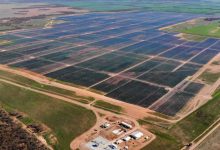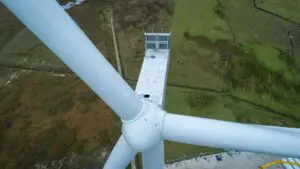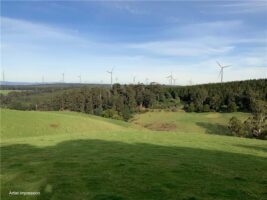Listed contracting group Decmil has revealed more details about its ongoing dispute over payments – or the lack of them – with the owners of the heavily delayed Sunraysia solar farm, which is stalled after failing to obtain registration as a power plant in New South Wales.
In what has become an all-too-common feature of the Australian renewable energy industry, Decmil says the dispute over the payments with Sunraysia owners (John Laing and Moaneng) was likely to drag on for up to another 18 months, although it said it is confident that it will win in the end.
Decmil also confirmed that it has effectively withdrawn from full EPC contracting in large scale renewables, and would focus only on “balance of plant” contracts for wind and certain solar farms. This effectively means it will do specific tasks, like installing panels, or building roads, but not take full responsibility for the construction and connection.
That is hardly surprising given the increasingly complex connection rules and commissioning delays, worsened by increased congestion in key parts of the grid and rule changes that have caused significant disputes between project owners and contractors over who should bear the financial cost of delays and lost revenue.
The nature and intensity of the disputes over the claim of “liquidated damages” – payments demanded to cover the loss of revenue from delayed projects – has caused several big contractors, including Downer Group, to quit the solar sector, claiming it is “too hard.”
It has also seen quarrels emerge – such as that between Windlab and its contractors on the year-long delays at the Kennedy Energy Hub – and go to arbitration.
That’s where the dispute over Sunraysia is headed. Decmil says the mechanical construction of Sunraysia (pictured above and which, at 200MW, would be the biggest solar farm in the state to date) was complete on time in December, 2019, but the project has not begun production because the plant failed to obtain the necessary R1 registration with the Australian Energy Market Operator.
Decmil said last year that it would suffer a $14 million hit to its anticipated cash flow because of the dispute over payments. The sum is not identified in its latest accounts released last Friday.
Decmil says in its presentation to analysts for its full year results that the delays to registration “are as a result of the AEMO and related Transgrid involvement in the approval process.”
It says that John Laing and Maoneng are holding Decmil responsible for the delays and claiming liquidated damages. Decmil also says it has identified, through additional testing, an issue concerning the operation of the inverter transformers supplied by Schneider Electric, although it says this problem should not affect R1 registration.
“Decmil’s position is that once the effect of its extension of time claim is determined the Project is not in delay,” it says in its report.
“In relation to the R1 registration, Decmil’s view is that it has provided everything necessary to obtain R1 registration, and anything further required is simply part of assisting the client in obtaining its registration.
“Decmil does not have a direct involvement in obtaining the registration, it can only be obtained by the client. The arbitrator has been appointed to resolve the issues between Decmil and Schneider Electric and Decmil continues to enforce defect rectification and damages recovery.
“Still, despite these problems, Decmil is not giving up on renewables, which provided nearly 40 per cent of its revenues in its latest financial year.
Decmil has ongoing “balance of plant” contracts at the Yandin and Warradarge wind projects in its home state of Western Australia – totalling $151 million – and says it is well positioned to capitalise on the forecast growth of renewable energy projects in Australia, particularly given the recent exit of competitors.
“Decmil has a unique opportunity to take market share and win new work in the fast growing renewables construction market,” it says in it market presentation, largely because of the collapse of RCR and the exit of Downer and others.
“In recent years, various competitors (including Downer and RCR) have exited the sector because they have been unable to get comfortable with the increased risk profile associated with such projects. Decmil has proven knowledge and experience in the sector across both wind farms and solar farms.”
It notes that with technological advancements, improved economics, social pressure and government policies aimed at reducing carbon emissions, renewable energy is forecast to account for around 83% of generation capacity by 2040, growing from a total of around 48GW in 2018 (sic) to around 125GW in 2040.
Decmil shares, which were trading above 90c in December before the Sunraysia issues were announced, are now trading at just 15c. It has also suffered difficulties with a key prison contract in New Zealand.
RenewEconomy sought further information from Decmil, but did not receive a response. The audio of a briefing to analysts was not available due to a “technical hitch”, a spokesperson said.









